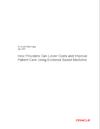
This White Paper provides an Information Technology approach that can deliver the situational awareness and decision support necessary for the healthcare industry reform movement to meet the challenges and opportunities faced by a country with the greatest healthcare infrastructure and largest expenditures in the world to deliver more effective care delivery across a broader patient community. This paper also highlights two case studies that demonstrate how technology can serve as a key component of effective healthcare delivery by creating the necessary data framework for practicing evidencebased medicine (EBM).
The theory behind EBM is one in which caregivers deliver patient-centered care in an open environment that provides access to systematic analysis of all available evidence in electronic format from an extensive, ever-changing, continually updating, reliable statistical set. Data sets may include standard clinical trial models, publications on medical protocols and their efficacy, demographic and genetic data, and day-to-day infield observations. This would allow physicians to balance their experience and training with EBM comparative data, which could provide real-time situational awareness and decision support.
Download How Providers Can Lower Costs and Improve Patient Care Using Evidence Based Medicine White Paper (.pdf, 163 KB).
Download from eHealthNews.EU Portal's mirror: How Providers Can Lower Costs and Improve Patient Care Using Evidence Based Medicine White Paper (.pdf, 163 KB).
For further information, please visit:
http://www.oracle.com/industries/healthcare/
Related news articles:
- Oracle Healthcare's Profile